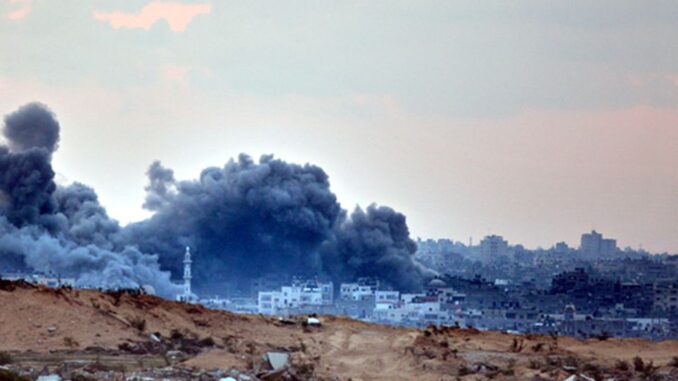
TELAVIV: As Israel vows to completely dismantle Hamas and its terror network, carrying out intensive strikes on Gaza targets in response to a land-sea-air assault by the Palestinian terror group, allegations regarding the use of white phosphorus bombs by the powerful West Asian nation are flying thick.
Palestine has accused Israel of employing phosphorus incendiary weapons in bombing densely populated areas within the Gaza Strip. Its Foreign Ministry expressed its concern on micro-blogging platform X, stating, “The Israeli occupation is using internationally banned white phosphorus bombs against the Palestinians in the Karama neighbourhood in northern Gaza.”
Rami Abdo, founder of the European Observatory for Human Rights, shared a video clip on the X platform, claiming it depicted Israel’s use of phosphorus bombs. He asserted, “Israeli military forces are using toxic white phosphorus [bombs] on densely populated areas northwest of Gaza City.” Human Rights Watch, a New York-based rights group, previously cited reports of Israel’s usage of white phosphorus bombs in Gaza during past conflicts.
While using white phosphorus weapons to generate a smokescreen and cover troop movements is legally accepted, the 1980 Geneva Convention prohibits its use in densely populated areas. The use of white phosphorus bombs on civilians is considered a war crime and was last used by Russia in Ukraine’s Bakhmut.
Numerous videos and claims circulating on social media suggest that Israeli forces have been employing banned white phosphorus bombs in the densely populated region of Gaza. The Gaza Strip, a Palestinian territory under Israeli blockade, has been governed by Hamas for many years. The Gaza Strip, which is under a total seize by the Israeli military, is one of the most densely populated places on Earth and home to over two million people residing in a visibly squeezed 362-square-kilometre area.
What Are White Phosphorous Bombs?
White phosphorus is a waxy, yellowish-to-clear chemical with a pungent, garlic-like odour. It is a highly combustible substance that burns quickly and brightly when exposed to air. Militaries worldwide, including the United States, utilize it in incendiary weapons for various purposes, such as illuminating targets at night or inflicting damage on enemies.
This chemical reaction produces intense heat (about 815 degrees Celsius), light, and thick white smoke, aiding armies in creating smokescreens in sensitive zones.
White phosphorus can cause fast-moving and widespread fires on the ground. Once ignited, the substance is challenging to extinguish, clinging to many surfaces, including skin and clothing. It poses significant dangers to civilians, causing severe burns that penetrate deep into tissue and bone, with the potential to reignite even after treatment.
Why Has It Been Banned by the UN?
In 1972, the United Nations General Assembly passed a resolution categorizing incendiary weapons as “arms viewed with horror.” The UN defines incendiary weapons as those designed to set fire to objects or cause burns or respiratory injuries to people through the action of flame, heat, or a combination thereof, resulting from a chemical reaction of a flammable substance, such as napalm or white phosphorus.
In 1980, the international community collectively agreed to ban or restrict the use of certain weapons causing excessive pain or harm to civilians. Protocol III of this agreement restricts the use of weapons that set things on fire.
5th Day Of Israel-Hamas War
Amidst the ongoing conflict, with Israel conducting airstrikes on the 5th day of the war in response to a multi-front Hamas attack on Israeli towns near the seaside territory on Saturday, questions regarding the use of white phosphorus bombs persist. Hamas justified its attack in response to Israeli violations in the flashpoint Al-Aqsa Mosque complex in occupied East Jerusalem and increased settler violence.
In retaliation, the Israeli Defence Forces (IDF) launched a vigorous offensive against Hamas targets in the Gaza Strip. Tragically, the combined death toll resulting from the conflict, encompassing Hamas’ attack on Israel and Israel’s retaliatory actions in Gaza, has exceeded 3,000 lives.
Bureau Report
Leave a Reply